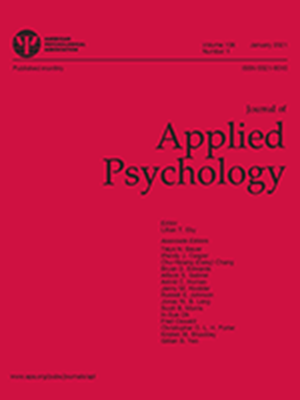全人适应性评估:利用职业信息网(O*NET)整合兴趣、价值观、技能、知识和个性。
IF 9.4
1区 心理学
Q1 MANAGEMENT
引用次数: 0
摘要
衡量个人职业契合度有许多重要目的,从帮助年轻人探索专业和职业,到帮助求职者评估与现有工作的契合度。然而,大多数现有的契合度测量方法都有局限性,因为它们只关注单一的个体差异领域,而没有考虑到契合度在多个领域之间可能存在的差异。例如,求职者可能对某项工作非常感兴趣,但却不具备做好这项工作所需的技能或知识。目前的研究通过评估一套综合的人职契合度测评来解决这个问题,该测评可测量职业兴趣、工作价值观、知识、技能和个性等五个领域的 88 个契合度维度。这些测评方法或是新开发的,或是从现有测评方法中改编而来,与职业信息网络数据库中的职业变量直接对应。通过三项不同样本的研究,我们获得了大量的信度和效度证据来评估适合度评估。研究结果一致表明,跨契合度领域的整合能够切实改善对相关结果的预测,包括职业选择以及主观和客观的职业成功。不过,一些契合度测量(如兴趣和知识)通常比其他测量(如性格)更能预测结果,因此在研究和应用中值得更多考虑。我们将讨论我们的研究结果是如何推进现代劳动力市场中人职匹配度测量的理论和实践知识的。此外,为了激励更多涉及全人适合度测量的研究和应用,我们公开了所有新开发的适合度评估,并提供了职业信息网络数据库的使用指南。(PsycInfo 数据库记录(c)2024 APA,保留所有权利)。本文章由计算机程序翻译,如有差异,请以英文原文为准。
Toward whole-person fit assessment: Integrating interests, values, skills, knowledge, and personality using the Occupational Information Network (O*NET).
Measuring person-occupation fit serves many important purposes, from helping young people explore majors and careers to helping jobseekers assess fit with available jobs. However, most existing fit measures are limited in that they focus on single individual difference domains without considering how fit may differ across multiple domains. For example, a jobseeker might be highly interested in a job, yet not possess the requisite skills or knowledge to perform the job well. The current research addresses this issue by evaluating an integrative set of person-occupation fit assessments that measure 88 fit dimensions across five domains: vocational interests, work values, knowledge, skills, and personality. These measures were either newly developed or adapted from existing assessments to directly correspond with occupational variables from the Occupational Information Network database. Across three studies with diverse samples, we obtained extensive reliability and validity evidence to evaluate the fit assessments. Results consistently showed that integrating across fit domains led to practical improvements in predictions of relevant outcomes, including career choice and subjective and objective career success. However, some fit measures (i.e., interests and knowledge) were generally more predictive of outcomes than others (i.e., personality), thus warranting greater consideration for use in research and applied contexts. We discuss how our results advance theoretical and practical knowledge concerning the measurement of person-occupation fit in the modern labor market. Moreover, to inspire additional research and applications involving whole-person fit measurement, we made all newly developed fit assessments publicly available, providing guidance for using them with the Occupational Information Network database. (PsycInfo Database Record (c) 2024 APA, all rights reserved).
求助全文
通过发布文献求助,成功后即可免费获取论文全文。
去求助
来源期刊

Journal of Applied Psychology
Multiple-
CiteScore
17.60
自引率
6.10%
发文量
175
期刊介绍:
The Journal of Applied Psychology® focuses on publishing original investigations that contribute new knowledge and understanding to fields of applied psychology (excluding clinical and applied experimental or human factors, which are better suited for other APA journals). The journal primarily considers empirical and theoretical investigations that enhance understanding of cognitive, motivational, affective, and behavioral psychological phenomena in work and organizational settings. These phenomena can occur at individual, group, organizational, or cultural levels, and in various work settings such as business, education, training, health, service, government, or military institutions. The journal welcomes submissions from both public and private sector organizations, for-profit or nonprofit. It publishes several types of articles, including:
1.Rigorously conducted empirical investigations that expand conceptual understanding (original investigations or meta-analyses).
2.Theory development articles and integrative conceptual reviews that synthesize literature and generate new theories on psychological phenomena to stimulate novel research.
3.Rigorously conducted qualitative research on phenomena that are challenging to capture with quantitative methods or require inductive theory building.
 求助内容:
求助内容: 应助结果提醒方式:
应助结果提醒方式:


